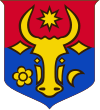Limba noastră
"Limba noastră" (Romanian pronunciation: [ˈlimba ˈno̯astrə] (![]()
| English: 'Our Language' | |
|---|---|
Sheet music | |
National anthem of | |
| Lyrics | Alexei Mateevici, 1917 |
| Music | Alexandru Cristea, ext. 1942 |
| Adopted | 1995 |
| Preceded by | "Deșteaptă-te, române!" "Imnul RSSM" |
| Audio sample | |
"Limba noastră" (instrumental)
| |
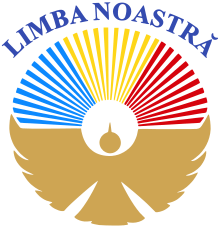
For a short period of time in the early 1990s, the national anthem of Moldova was "Deșteaptă-te, române!", which was also (and remains today as) the national anthem of Romania.[2] The lyrics were written by Alexei Mateevici (1888–1917) a month before his death.[3] Mateevici contributed significantly to the national emancipation of Bessarabia. The music was composed by Alexandru Cristea.
History
Uniquely among national anthems, the focus of "Limba noastră" is language, in this case, the national one of Moldova, Romanian[4] (also referred to as "Moldovan" in Moldova).[lower-alpha 1] It calls for the people to revive the usage of their native language. The poem does not refer to the language by name; it is only called poetically "our language".
"Limba noastră", like "Deșteaptă-te, române!", makes reference to the awakening from the sleep of death: "a people suddenly awaken from the sleep of death" and "awaken, Romanian, from the sleep of death", respectively.
Lyrics
| National anthems of Moldova | ||||||||
|---|---|---|---|---|---|---|---|---|
|
||||||||
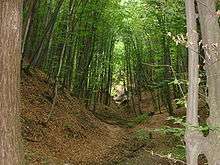
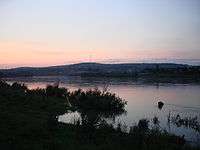
"Limba noastră" is based on a twelve-verse poem. For the officially-defined national anthem used today, the verses were selected and reorganised into five stanzas of four verses each, specifically verses 1, 2, 5, 9, and 12 (which are highlighted in bold).
Original Romanian |
Moldovan Cyrillic |
English translation |
Limba noastră-i o comoară |
Лимба ноастрэ-й о комоарэ |
A treasure is our language that surges |
Images
 Moldovan stamp depicting a Romanian language class. The teacher is explaining the lesson. On the blackboard is written a quatrain from the "Limba noastră".
Moldovan stamp depicting a Romanian language class. The teacher is explaining the lesson. On the blackboard is written a quatrain from the "Limba noastră". Moldovan stamp bearing the first verses of the anthem.
Moldovan stamp bearing the first verses of the anthem.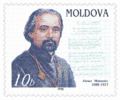 Mateevici, author of the poem. In the background are written quatrains from the "Limba noastră".
Mateevici, author of the poem. In the background are written quatrains from the "Limba noastră".
See also
Notes
- The constitution of the Republic of Moldova refers to the country's language as Moldovan, whilst the 1991 Declaration of Independence names the official language Romanian. In December 2013, a decision of the Constitutional Court of Moldova ruled that the Declaration of Independence takes precedence over the Constitution and that the state language is therefore Romanian, not "Moldovan".[5]
- The Moldovan Cyrillic alphabet was officially used between 1924 and 1932 then in 1938 to 1989 during the Soviet Union (as the lyrics were written in 1917), and is still used officially in the region of Transnistria.
References
- "20 de ani fără "Deșteaptă-te, române!"". adevarul.ro. June 2014.
- "Moldova: Limba noastră". NationalAnthems.me. Retrieved 2012-02-25.
- "De Ziua Limbii Române, "Limba noastră" va răsuna din turnul Primăriei Cluj". ziuadecj.realitatea.net. 2017-08-30.
- "Poezia "Limba noastră", de Alexei Mateevici, a împlinit un secol". 10tv.md. June 2017.
- "Moldovan court rules official language is 'Romanian,' replacing Soviet-flavored 'Moldovan'"
- "Limba noastră". Poezie. 2010-02-21. Retrieved 2019-08-23.
- http://www.versuri-si-creatii.ro/poezii/m/alexei-mateevici-6zudscu/limba-noastra-6zutscu.html
- "Лимба матернэ — флоаре етернэ". Лимба молдовеняскэ (in Moldovan). 2015-04-24. Retrieved 2019-08-23.
- Minahan, James B. (2009-12-23). The Complete Guide to National Symbols and Emblems [2 volumes]. ISBN 9780313344978.
External links
| Wikimedia Commons has media related to Limba noastră. |
| Romanian Wikisource has original text related to this article: |
- Wikisource, "Limba noastră", full text of Mateevici's poem (in Romanian)
- State Symbols of the Republic of Moldova – The official page of the Republic of Moldova features a page about the flag and anthem, which include vocal and instrumental versions
- President's House – The official website of the President of Moldova has a page with information about the anthem. The Romanian version of the page also contains the music score of the anthem.
- Moldova: Limba noastră – Audio of the national anthem of Moldova, with information and lyrics
- "Romanian Nationalism in the Republic of Moldova" by Andrei Panici, American University in Bulgaria, 2002
